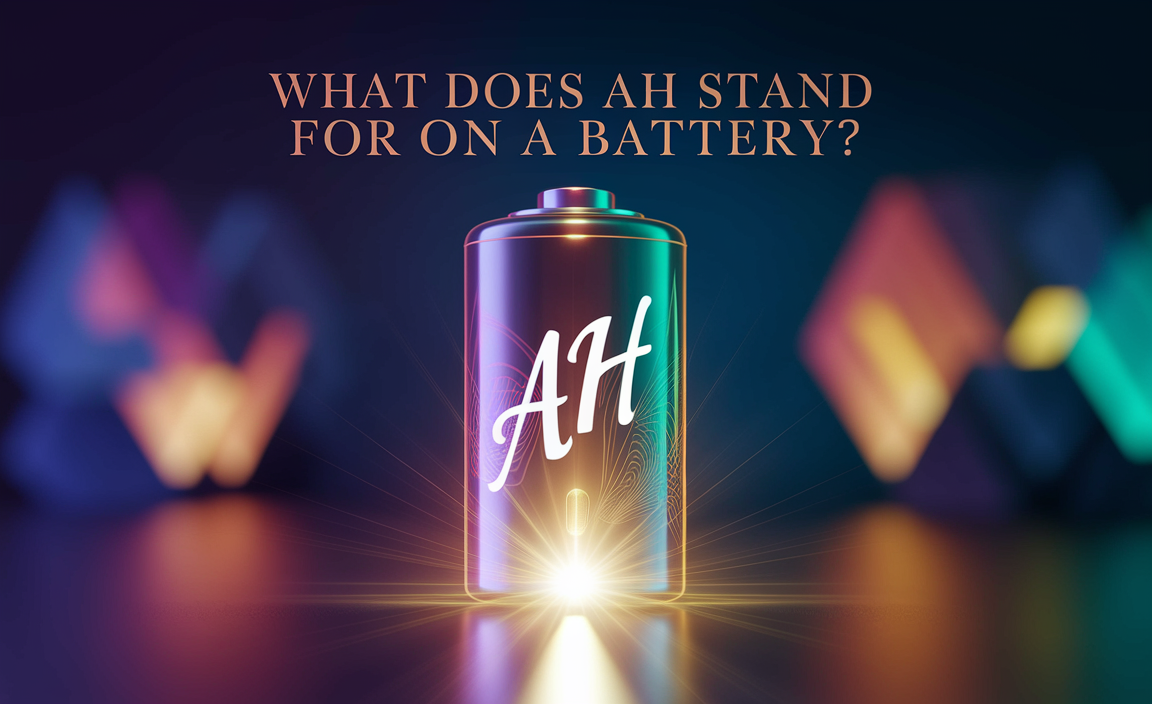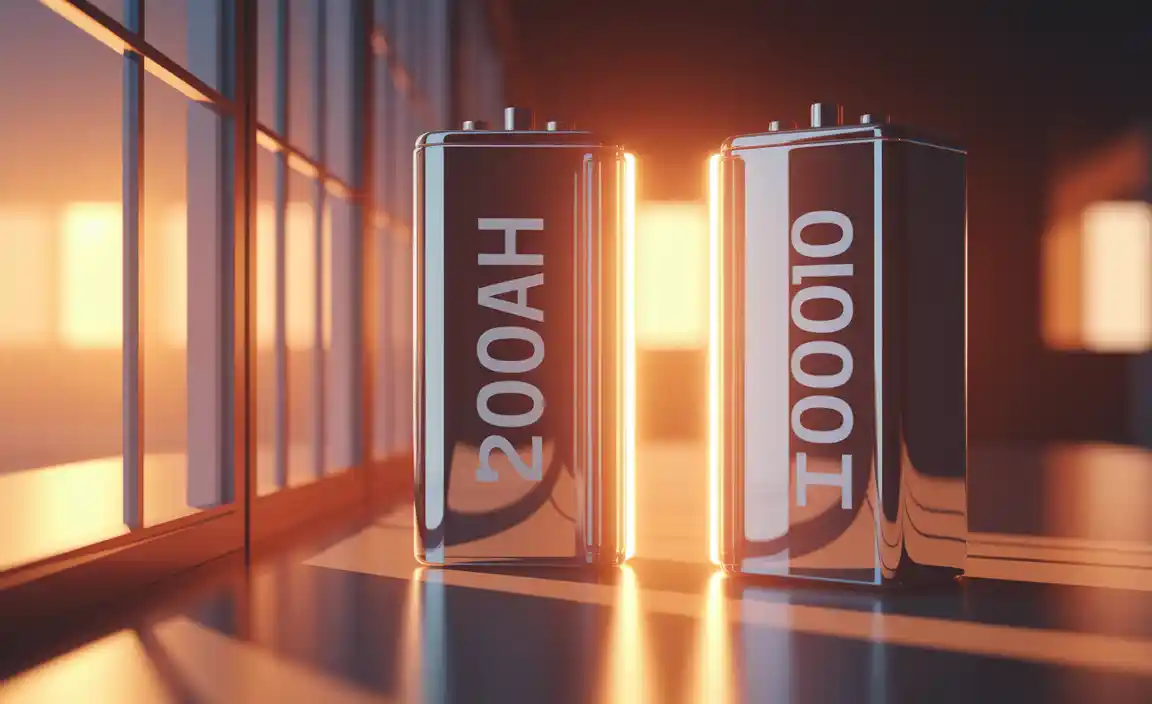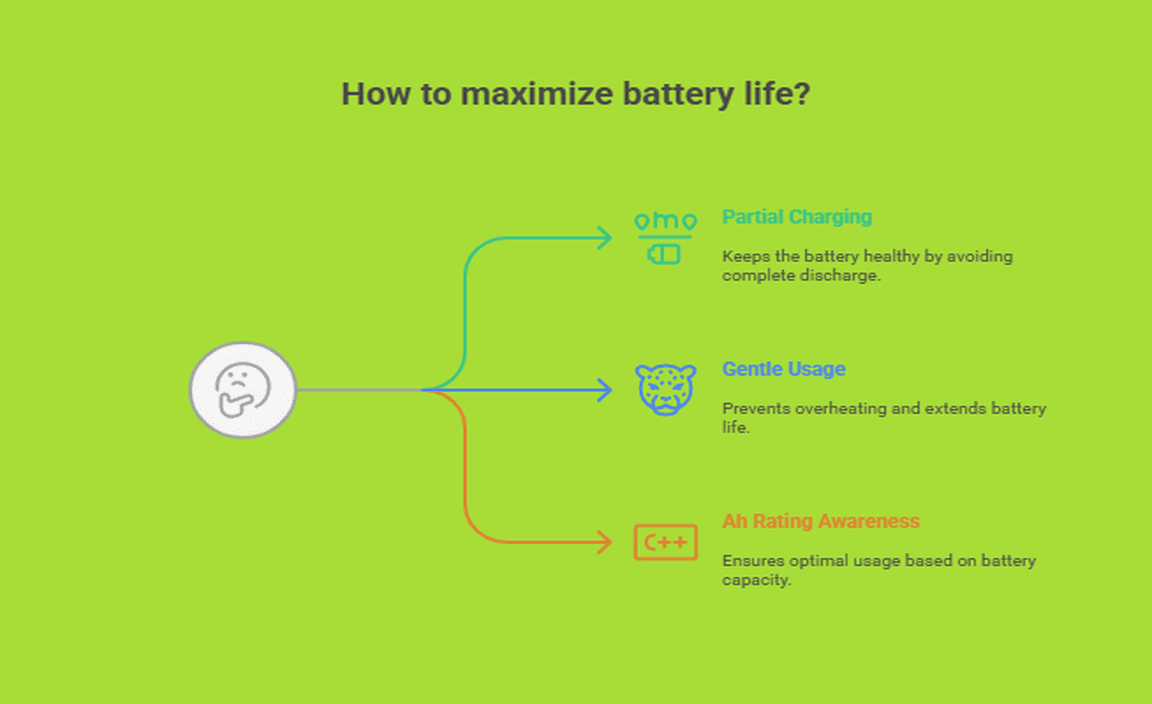Have you ever looked at a battery and wondered what all those letters mean? One letter combination you might see is “Ah.” It stands for ampere-hour. But what does that really mean for your gadgets and devices?
Think about your favorite toy. If it runs out of battery, it stops working, right? The Ah rating helps us know how long a battery can power that toy before it needs a recharge.

Imagine having a magical battery that never runs out. Cool, right? While we don’t have that, understanding what Ah means can help you choose the right battery for your needs. Let’s dive deeper into why this little abbreviation matters so much!
What Does Ah Stand For On A Battery? Understanding Battery Ratings
Battery labels can be confusing. Have you ever seen “AH” and wondered what it means? “AH” stands for ampere-hour. This shows how much electricity a battery can store and how long it can power a device. For example, a battery with 10 AH can run a 10-amp device for one hour. Knowing this helps you pick the right battery for your gadgets. Isn’t it interesting how a little label can tell you so much?
Understanding Battery Terminology
Explanation of common battery terms. Importance of knowing battery specifications.
When you hear terms about batteries, it can sound like a secret code sometimes. Brightening up your battery vocabulary is super important! Knowing what “capacity,” “voltage,” and “amp hours” mean helps you choose the right battery for your needs. For example, an amp hour (Ah) measures how much energy a battery can store. This is key when you want your toys or gadgets to last long enough for fun! A little knowledge goes a long way—and it saves you from awkward battery disasters!
| Term | Meaning |
|---|---|
| Capacity | Amount of energy stored |
| Voltage | Power level of the battery |
| Amp Hour (Ah) | Energy over time; how long it lasts |
Defining Ah: Ampere-Hour
Detailed definition of Ah. Explanation of how Ah measures battery capacity.
Ampere-hour, or Ah, is a unit that shows how much electric charge a battery can hold. It tells us how long a battery can provide power. For example, a battery rated at 10 Ah can deliver 10 amps for one hour. This means it has enough energy for a specific amount of time, depending on how much power you use. Batteries with higher Ah ratings usually last longer.
What does a higher Ah rating mean?
A higher Ah rating means the battery can store more energy. This is useful for devices that need power for a long time.
- A 5 Ah battery lasts 5 hours at 1 amp.
- A 10 Ah battery lasts twice as long, at 10 amps for 1 hour.
Why Ah Matters in Battery Performance
Impact of Ah on battery life and efficiency. Comparison of batteries with different Ah ratings.
The “Ah” rating shows how much energy a battery can store. Higher Ah means longer battery life. For example, a battery with 200Ah lasts longer than one with 100Ah. This affects efficiency too. When you have more Ah, you can run devices longer without charging.
Here’s how it breaks down:
- 200Ah: Good for use in big machines or longer camping trips.
- 100Ah: Suitable for small gadgets or short trips.
Choosing the right Ah helps you pick the best battery for your needs.

What does Ah mean in battery ratings?
Ah stands for Ampere-hours. It shows how much charge a battery holds. More Ah means more usage time for your devices.
How to Calculate Battery Requirements Using Ah
Stepbystep guide on calculating needed Ah for various applications. Examples of calculating Ah for different devices.
Calculating how much Ah (amp hours) you need is easier than pie! First, pick the device you need it for. Look at how many watts it uses. For example, if a toy car needs 10 watts and you want it to run for 2 hours, you’d need 20 Ah. That’s math magic!
| Device | Watts Used | Hours Needed | Amp Hours Required |
|---|---|---|---|
| Toy Car | 10 | 2 | 20 Ah |
| Tablet | 5 | 4 | 20 Ah |
| LED Light | 2 | 10 | 20 Ah |
To find your Ah, use this formula: watts x hours = total Ah. Easy peasy! Now you’re ready to power up your gadgets with confidence. Just remember: more Ah means more fun! Or at least longer playtime!
Factors Affecting Ah Ratings in Batteries
Discussion of factors influencing Ah ratings (e.g., temperature, age). Differences between battery types (leadacid, lithiumion, etc.).
Many factors change the Ah ratings in batteries. Temperature can affect how well a battery works. A hot battery might work less efficiently. Age is also important. Older batteries usually hold less charge than new ones. Different battery types behave differently:
- Lead-Acid: Good for cars, but heavy and wear out faster.
- Lithium-Ion: Common in phones. They last longer and charge faster.
Choosing the right battery type matters for your device’s performance!

What factors affect Ah ratings in batteries?
Temperature and age significantly affect battery performance. The type of battery also plays a huge role. For example, lead-acid batteries drain faster than lithium-ion batteries, especially as they age.
Practical Applications of Ah in Everyday Devices
Examples of devices and their Ah requirements. Understanding how to choose the right battery based on Ah.
Many everyday devices need batteries with specific amp-hours (Ah). Knowing the Ah helps us pick the right battery. Here are some common devices and their typical Ah needs:
- Smartphones: 1.5 – 3 Ah
- Laptops: 4 – 12 Ah
- Toy Remote Control Cars: 1 – 2 Ah
- Electric Bikes: 10 – 20 Ah
Choosing the right battery depends on how long you want the device to run. A battery with higher Ah lasts longer but may be bigger. Always match the Ah to your device’s requirements for the best results.
What is amp-hour (Ah) in a battery?
Amp-hour (Ah) measures a battery’s energy capacity. It shows how much power a battery can deliver over time. For example, a 1 Ah battery can supply 1 amp of current for 1 hour. This helps us know how long our devices can run.
Common Misconceptions about Ah in Batteries
Debunking myths related to Ah ratings. Clarifying confusion between Ah and other measurements.
Many people think that “Ah” is just a fancy way to say how good a battery is. But it’s more like a battery’s nap time! “Ah” stands for amp hours, which tells us how much power a battery can store. However, some confuse this with volts or watts. Imagine mixing up cupcakes and cookies—both sweet but very different! Understanding this clears up the cake of confusion.
| Measurement | What It Means |
|---|---|
| Ah (Amp Hours) | Storage Capacity |
| V (Volts) | Voltage Level |
| W (Watts) | Power Consumption |
So, remember that Ah ratings are important but don’t get lost in battery lingo! Knowing this helps you pick the right batteries, so your gadgets keep running. After all, a lonely battery is like a cake without frosting—no fun!
Tips for Maximizing Battery Life Based on Ah Ratings
Best practices for maintaining battery health. Choosing the right usage patterns based on Ah understanding.
To keep your battery happy, follow a few simple tips! First, try not to let it die completely. Batteries love a little charge now and then. Next, you should aim for kind and gentle usage. Avoid running it like a cheetah in the wild. Instead, keep it in low-power mode during quiet times. Lastly, always read the Ah rating—it’s like your battery’s secret code for the best life practices.
| Tip | Description |
|---|---|
| Charge Regularly | Don’t wait for the battery to be empty. |
| Gentle Usage | Use low-power modes during quiet times. |
| Know the Ah Rating | Learn about your battery’s capacity. |
Conclusion
In summary, “AH” on a battery stands for ampere-hours. This tells you how long a battery can power your devices. Higher AH means longer usage. You should check this rating when buying batteries for your gadgets. For more details, explore battery guides online. Understanding this can help you choose the right battery for your needs!
FAQs
What Does The “Ah” Rating Indicate About A Battery’S Capacity And Performance?
The “Ah” rating means “amp hours.” It shows how much energy a battery can store and use. A higher Ah rating means the battery lasts longer before needing a recharge. So, if you pick a battery with more Ah, it can power your devices for a longer time!
How Does The Amp-Hour (Ah) Rating Influence The Duration A Battery Can Power A Device?
The amp-hour (Ah) rating tells us how much energy a battery can store. If a battery has a higher Ah rating, it can power a device for a longer time. For example, a battery with 10 Ah can run for twice as long as a battery with 5 Ah. So, when choosing a battery, look for a higher Ah rating to keep your device running longer!
What Are The Differences Between A Battery With A High Ah Rating And One With A Low Ah Rating?
A battery with a high Ah rating can store more energy than one with a low Ah rating. This means it can power your toys or devices for a longer time without needing a charge. If you have a big toy that needs lots of energy, a battery with a high Ah rating is better. A low Ah battery can run smaller devices, but it will not last as long.
How Can You Calculate The Amp-Hour Rating Of A Battery Based On Its Usage And Discharge Rates?
To find the amp-hour rating of a battery, you need to know two things: how much power it uses and how long it runs. First, check how many amps (a way to measure electricity) you use each hour. Next, multiply that number by the total hours you need the battery to last. This will give you the amp-hour rating. For example, if you use 2 amps and need it for 5 hours, the battery needs to have at least 10 amp-hours.
In What Scenarios Would You Prioritize A Battery With A Higher Ah Rating Over Other Specifications?
You should pick a battery with a higher Ah (Amp-hour) rating when you need it to last longer. For example, if you’re using a toy or device for many hours, a higher Ah battery will give you more playtime. It’s great for things like electric cars or big toys that need lots of power. When you want to keep your fun going without recharging often, choose the higher Ah battery.
Resource:
-
How Batteries Store Energy: https://www.explainthatstuff.com/batteries.html
-
Basics of Electric Current and Amps: https://www.electronics-tutorials.ws/dccircuits/current.html
-
Types of Rechargeable Batteries: https://www.energy.gov/eere/vehicles/articles/types-rechargeable-batteries
-
How Temperature Affects Batteries: https://batteryuniversity.com/article/bu-502-temperature-effects-on-battery





